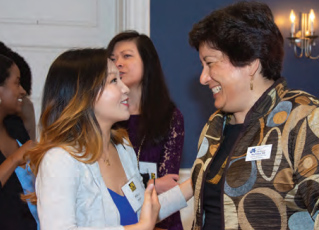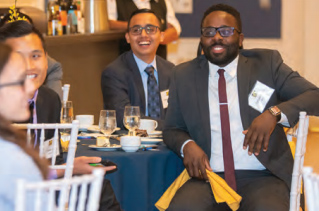Profile: Ana Núñez, MD, HU '86
The College of Medicine alumna, professor and physician focuses on developing diversity, equity and inclusion among providers and within the field as a whole to improve the quality of medical care.
When, as a 9-year-old girl, Ana Núñez announced at the dinner table that she wanted to become a doctor, her family quickly corrected her.
She could become a nurse, they said. But women aren’t doctors. Growing up "Spanglish" in Altoona, Pennsylvania, Núñez didn’t have many role models around her that would indicate anything other than that as the extent of her possibilities. But she persisted in her vision.
Later, as an undergraduate student at Wilkes University in Wilkes-Barre, Pennsylvania, Núñez faced yet another barrier of disbelief at the idea that she could achieve her dream of becoming a doctor.
As a chemistry major and an excellent student on the pre-health track, Núñez began receiving solicitations from Harvard Medical School and other prestigious programs during her junior year. But in addition to her academic success, she was also president of the student government. Nowadays, that would have been a point in her favor. Then it meant that her advisers and professors thought that she wasn’t serious enough about academics to do well in medical school.
When she presented her pre-health adviser with the recruitment letters from Harvard and other schools, he said simply: "Throw them away."

Above and below: The Diversity Senior Celebration Dinner follows a tradition begun at MCP by James Batts, MD, an African American faculty member, who retired as professor emeritus in 1989. Batts, at his own expense, hosted a dinner at the Germantown Cricket Club, where the event is still held.

"What?" she replied.
"Throw them away, you’ll never get in," he told her. Núñez was shocked, and disappointed. But once again, she didn’t listen.
She had done well on her MCATs, and decided to still apply. She eventually got into four medical schools, and chose to attend Hahnemann because it was only four hours away from her parents and gave her good financial aid.
Now, as the associate dean for diversity, equity and inclusion at Drexel University College of Medicine, Núñez makes it her business to send a different message to those intent on pursuing the medical vocation. She tells all students, of all backgrounds, that not only do they belong in the profession, but their unique experiences, backgrounds, and skills are, in fact, vital to the betterment and growth of medicine.
‘We have to do better’
On an unseasonably hot day in early October, Núñez walks the hallways of the College’s Queen Lane Campus in East Falls. Around every corner she sees a student whom she knows by name, greeting them, asking them how their studies are going as she continues on her way.
Núñez knows pretty much all of the nearly 500 first- and second-year students on campus, not to mention many of the third- and fourth-year students, who are busy doing rotations, and the many students who have since graduated and started practicing in the field.
The kind of personal attention she offers her students is indicative of the respect and support that she has cultivated in her practice as a doctor, researcher, and advocate for better, more accessible health care.
Núñez was born and raised in Altoona — "not where a lot of Latinos are." Her dad was born in Ponce, Puerto Rico, and her mom had immigrated to New York City as a child from Valencia, Spain. Núñez’s parents met in New York and eventually moved to the small city in central Pennsylvania so that their children could have access to good educational opportunities, and enjoy playing outside, surrounded by grass and trees.
Though there were many immigrants in the city, most were from Europe and had been there for several generations. The Núñez family did face discrimination because there wasn’t really anyone like them, Núñez said.
But because there was no wider community context for her Latinidad, Núñez said that she didn’t really feel "Latina" until she came to study at Hahnemann University in the 1980s. She discovered that though it presented some barriers in how people perceived her, her identity as a Latina and her knowledge of Spanish shaped her experience as a medical student and beyond.
Her knowledge and unique identity also became something she learned to value, Núñez said. She witnessed early on in her medical career how the lack of doctors and nurses with different backgrounds and cultural competency and knowledge can cause serious problems. At some point in training, she was called in to speak to a 25-year-old Puerto Rican woman who had given birth to her sixth child three days before. The baby had a fever, though, and had been separated from the mom so that the baby could receive proper care.
But the mother was, in the words of some of the other doctors, being "a pain in the butt." They didn’t understand why she was upset and asked Núñez to speak with her. "She looks me in the eye and she says, ‘You people killed my baby,’" recalled Núñez.
She responded in disbelief. "What?!"
The woman said that she had had five other babies in the same hospital, and they had always been given to her as soon as they were born. This one, though, had been taken away.
Núñez realized that no one had attempted to explain to the mother where her child was, nor had they taken her to go see the baby in the nursery. The mother had assumed that the child had been killed, or had died.
"How can this be OK?" Núñez recalled wondering at the time. "We have to do better than this."

First-year students from groups underrepresented in medicine are welcomed by older students at a party at Núñez’s home after the White Coat Ceremony.
Bridging the gap
Spurred by the disconnects she saw in medicine that exacerbated health disparities, Núñez decided to focus on medical education training and health services research in the course of two fellowships she completed after becoming a general internal medicine practitioner.
She examined how providers can do better in terms of cultural competency and quality of care, developing a curriculum centered on how interventions could be utilized in the health care process, from people in the community to health care providers — and how, from there, people could be empowered to care and advocate for their own health. This ultimately led Núñez to found Philadelphia Ujima in 2007, an initiative which grew to include more than 30 different local organizations and partners in supporting community members in developing healthier habits and aided in distributing vital medical education in a variety of ways.
"I have forever been the holistic, complex, how-do-youapproach-the-whole-system kind of person," Núñez said of her approach as a doctor.
Núñez acknowledged that it is an outlook which runs counter to a controversial op-ed published in the Wall Street Journal by a former associate dean of curriculum from the University of Pennsylvania, who argued that there was too much focus on "social justice" at the expense of technical medical expertise at medical schools today [wsj.com/articles/take-two-aspirin-and-call-me-by-my-pronouns-11568325291].
The need for consideration of lived environments and experiences is vital, and to illustrate her point Núñez pointed to something she discovered while working with Philadelphia Ujima. She explained that in the course of her work with the initiative, she discovered that some people do not have refrigerators in their homes. If they have diabetes, this means that their insulin will go bad because it is not refrigerated, and even if they are taking it faithfully, it will not work for them. "The whole idea that you have to choose between medical care and attending to sociocultural determinants of health is really a false sort of dichotomy," Núñez said. Medical students and doctors, she said, "can do both."
In this context, a focus on women’s health equity has been a vital part of Núñez’s work. In addition to her role as associate dean, Núñez is also the director of the National Center of Excellence in Women’s Health and the Women’s Health Education Program at Drexel.
Núñez is particularly proud of her contributions to heart health awareness for women. In the early 1990s, she helped create a dissemination campaign that informed not just consumers, but also doctors and providers about the varying symptoms of heart attacks in women.
She believes that better research and funding options for how medications affect women is a necessary step towards addressing gaps in care. Núñez noted that once the field of obstetrics and gynecology was established, there was a view by medical providers that "Oh good, we don’t have to do women’s things.
"But that’s also just implying that you are your gonads," Núñez observed. She said that many studies even today are still conducted with male mice and rats, which are cheaper for laboratories to purchase, and skew the results of drug trials so that most of what is known about how the drug operates is in relation to its effect on men.
"The things that we say are true were done on half the population" in many cases, Núñez said.
Full circle
Though Núñez said she faced barriers in her journey through medicine, she is now in a position, and in an environment, where the focus is on expanding access to the medical field for people of more diverse backgrounds, and also enhancing the quality of care for all people.
Núñez said former Dean Daniel Schidlow and current Dean Charles Cairns of the College of Medicine, along with the president of Drexel University, John Fry, have helped continue and enhance the heritage of both Hahnemann Medical College, founded in 1848, and Woman’s Medical College of Pennsylvania, founded in 1850.
Both institutions historically looked to give groups underrepresented in medicine — women as well as immigrants and African Americans — an opportunity to study in the field that had long been closed to them. It is a tradition which the school, under its new name, continues to uphold today, Núñez said. Having providers that come from different backgrounds is essential for the quality of health care as a whole, she noted. "The experiences and perspectives that you bring into the space flavor your antenna, in terms of what are the nuances, how do you understand what’s going on, and how can you best serve using your talents," she said.
Though there are many obstacles that remain in establishing greater equity in health care, Núñez is as intent as ever on tackling every challenge she can find.
"I usually try to do not easy things," she admitted with a laugh.
And Another Thing...
The Al Día profile of alumna Ana Núñez, MD, was published in honor of her selection as the winner of the 2019 Hispanic Heritage Award for Health from Al Día News. Also in 2019, Núñez was a recipient of the Hispanic Health Leadership Award from the National Hispanic Health Foundation, which honors leaders for their innovative strategies that improve the health of Latino communities. The foundation is the philanthropic arm of the National Hispanic Medical Association. Núñez is a graduate of ELAM, the Executive Leadership in Academic Medicine program for women, a national program based at the College of Medicine.
Back to Top